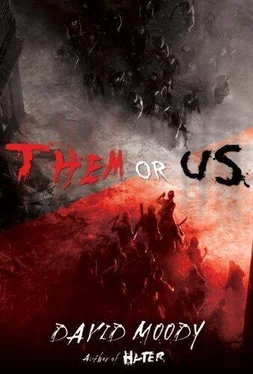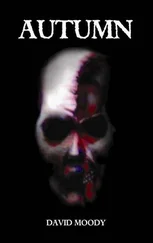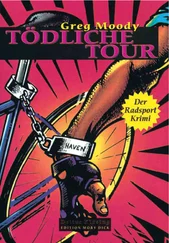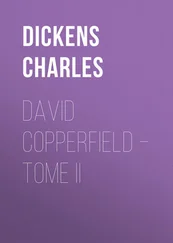“I might have a problem,” he whispers.
“Unchanged?”
“Not this time.”
“What, then?”
“Settlers. I need you to check them out for me.”
“Why me?”
“Christ, Danny, why do you always ask the same damn questions? You know why. You’re forgettable. No one notices you. No one even gives you a second glance.”
“Thanks.”
“You know what I mean. You can handle yourself. Doesn’t matter who or what you come across, you treat them all the same. You don’t rush in there with your fists flying like everyone else I’ve got who could go.”
Bit of a backhanded compliment, but that’s as good as it gets with Hinchcliffe.
“So what’s your problem?”
“Little issue with the neighbors,” he says, grinning again. “There’s something going on down there, I’m sure of it. I’ve been talking to them for a while, trying to get them to pack up and come up here. Thing is, they wanted to stay where they were, so I figured I’d keep them with us and let them get the place organized for me, then get in there and annex them.”
“I take it things aren’t going to plan?”
He screws up his face and takes another drag on his cigarette.
“It’s not that,” he explains, “I’m just starting to get a little uneasy. There are about thirty of them, and they’re not being as cooperative as I’d like. I think they’re stockpiling and digging in, and I need to get a handle on things.”
“Before someone else does?” I suggest. He pauses, and for a fraction of a second I think I might have overstepped the mark. Then he grins again and points at me.
“You got it! See, you don’t miss a trick, Dan. That’s why I like you!”
He doesn’t like me and we both know it. Fucking idiot.
“So what do you want me to do?”
“There’s a guy called Warner running things down there. John Warner. He’s a local. Came with the territory.”
“You don’t trust him?”
“I don’t trust anyone,” he answers quickly. “Do you know Neil Casey?”
I struggle for a few seconds to place the name. I know he’s one of Hinchcliffe’s top cronies, but, truth be told, they’re all the same to me. Their personalities have become diluted. Rufus says they’ve been de-individualized, and I know what he means. I can only tell them apart by comparing their scars and their level of aggression. I lose track of which one’s which, but I think I know who Casey is.
“Tall guy, nasty scar on the back of his head?”
“That’s him. I sent him down there a few days ago, and he hasn’t reported back to me yet. You know the routine, Dan, if you’re working for me and I send you outside Lowestoft, you make contact at least once every twenty-four hours. That’s the deal.”
“You think they’ve got rid of him?”
“I don’t know what I think, and that’s why I want you to go there. Try to get a feel for what’s going on and let me know if there’s anything I should be worried about, OK?”
I don’t want to go anywhere, but what else can I say? Hinchcliffe doesn’t ask, he tells.
“OK.”
“Good man. Take a car from the pool, pick yourself up a radio, and get down there as soon as you can.”
“Now?”
“Why? You got something better to do?”
“No, it’s just that I don’t feel—”
“Get down there now and report back to me tonight. The sooner you go, the sooner you get back, and the happier I’ll be.”
Bastard. I can’t stand being used like this, but what choice do I have? It’s do the job or risk a beating, maybe worse. I get up to leave, but I’m not even halfway across the room when the coughing starts again, worsened no doubt by Hinchcliffe’s smoking and the arid, dry heat in here. I’m doubled over before I know what’s happening.
“You’ve got to start taking better care of yourself, Danny,” Hinchcliffe shouts after me, “you’re a key member of my team.” I glance back at him but I don’t react. Is he being genuine or sarcastic? I can’t tell the difference anymore.
6
HINCHCLIFFE HAS BUILT UP a vast collection of cars in varying states of disrepair. He has several mechanics working for him, but their skills are seriously lacking, as are their resources. Crude bodywork repairs are generally managed, but if their engines don’t run the cars are stripped down for spare parts, then dumped, much the same as everything else. Hinchcliffe’s car pools are starting to look more like scrapyards with heaps of discarded body parts building up and fewer complete vehicles. Some cars have been increasingly cannibalized to keep them running. They look like something out of a third-rate rip-off Mad Max movie but without the performance; sheets of metal welded over missing doors, mismatched tires, wire-mesh windows …
Hinchcliffe keeps most of the better vehicles in a parking lot behind what used to be the police station, and the rest on a guarded patch of wasteland adjacent to the railway station. I always try to take the same car. The guards and mechanics look at me as if I’m crazy because I never go for the one with the biggest engine, the strongest body, or the most space inside. Instead I choose the same little silver, box-shaped car every time—a safe, reliable, old man’s car. Hardly the Road Warrior, but the reason I use this one is simple: I know it’s got a working CD player.
For a long time at the height of the fighting, driving wasn’t such a great idea. In the weeks leading up to the nuclear bombings, when the Unchanged still outnumbered us and before they squandered their last remaining military advantage in desperation, it was generally too dangerous to risk traveling anywhere by road. Now, though, it’s the lack of people and fuel that makes the roads—what’s left of them anyway—quieter than ever. For me, getting in a car today is a relief, a way of shutting out everything and everyone else for as long as the journey lasts—and when you have music, the effect is so much more complete …
I leave the railway station with music blasting out, ignoring the bemused stares I get from fighter guards who look at me like I’ve gone insane. I never used to listen to this kind of music, but I don’t care anymore. The name of the piece, the composer, the conductor, the orchestra—none of that matters now. All that’s important is the effect. The sound takes me back to a time when people sang and laughed and played instruments and made CDs and listened to the radio and went to gigs. A time when people didn’t kill each other (that often), and when having a bad day meant you’d missed something on TV or you’d had a run-in with someone at work.
Checkpoint.
There are two guards on duty here at the gate that spans the bridge. The stretch of water below is called Lake Lothing, although it’s less of a lake at this point, more a narrow channel that runs into the sea. One of the guards mans the gate in the cordon; the other stands at the side of the road and flags me down. This guy’s always around here. He lost the bottom part of his left leg in the war, but he still keeps fighting. His stump is wrapped up with layers of old, crusted brown dressings, and he rests it on a pile of sandbags level with his other knee so he can stay standing upright. That pile of ballast is probably the closest he’s ever going to get to a false leg. I stop a short distance away (far enough so he can’t hit me without hopping over first) and wind down the window. I refuse to turn off the music.
“This one of Hinchcliffe’s cars?” he asks, shouting to make himself heard.
“I’m doing a job for him,” I shout back. “Check with him if you want.”
“What?”
“I said check with him.”
He still can’t hear me. “Turn that shit down, you fucking idiot.”
Читать дальше












